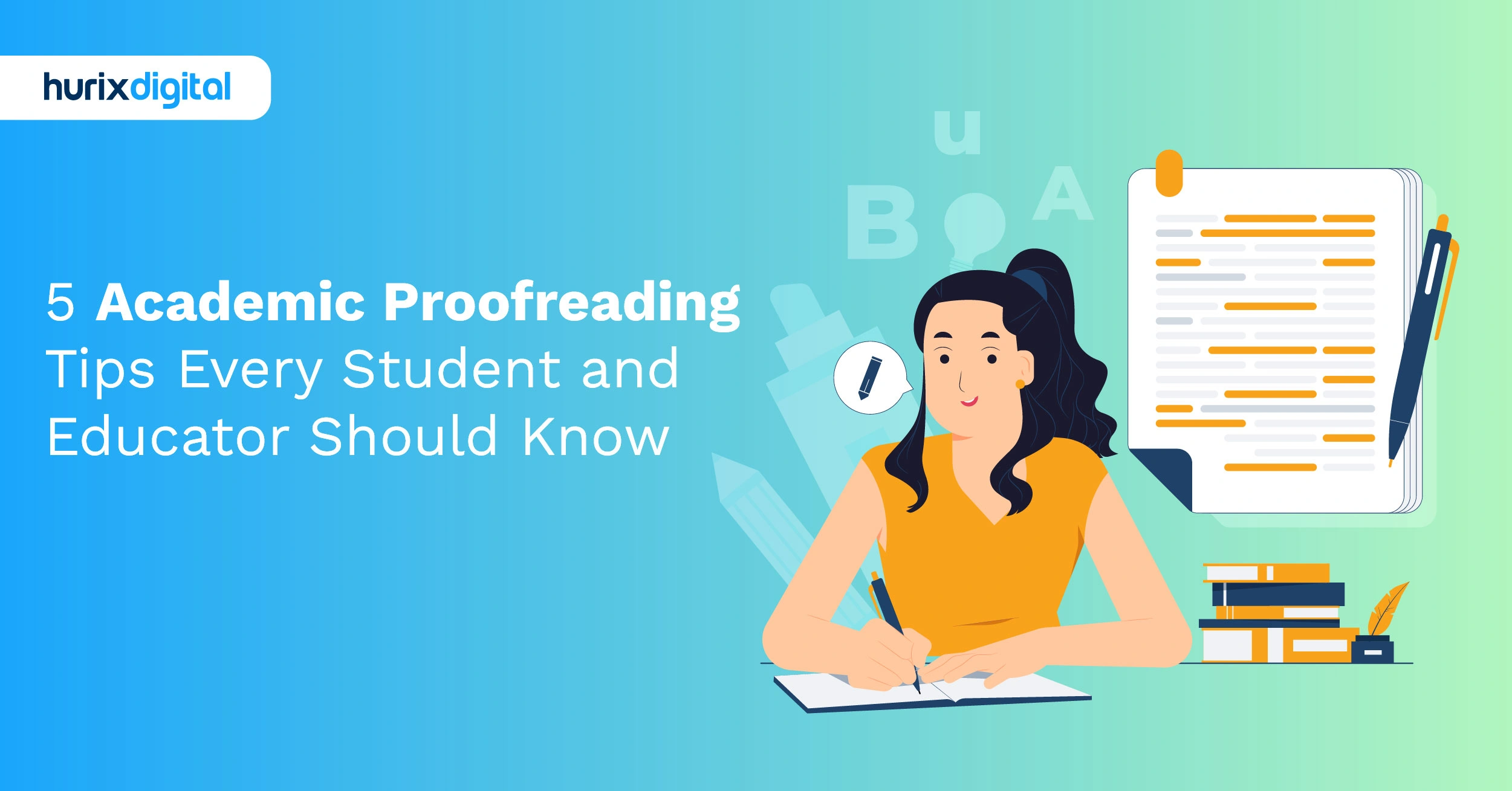
5 Academic Proofreading Tips Every Student and Educator Should Know
Summarize with:
There is always a need to be keen, especially when it comes to formatting and proofreading papers to be submitted. Academic proofreading involves correcting spelling and grammar mistakes and making sure the format is correct, citations are correct, and the paper is coherent.
This is important for papers written according to particular citation styles, such as APA, MLA, Chicago, or Harvard. The well-structured proofreading process helps ensure that the work adheres to these standards to avoid penalty or rejection.
Here, we will discuss some useful tips on proofreading academic papers with different citation formats that will help fine-tune the overall quality of the paper.
Table of Contents:
- The Importance of Proofreading in Educational Content
- What is the Role of Professional Proofreading Services?
- 5 Ingenious Strategies for Proofreading Varied Academic Documents
- Top 5 Tips for Academic Proofreading Papers with Various Citation Formats
- How to Ensure Inclusivity in Learning Materials?
- Identify Your Audience
- Avoid Generalizations and Judgments
- Check for Biases and Stereotypes
- Be Conscious of Your Tone
- Keep Your Content Accessible
- Make Your Content Engaging
- Inclusive Design
- Get Feedback
- Avoid Using Derogatory Terms
- Be Age-Inclusive
- Be Sensitive to People with Disabilities
- Be Racially Aware
- Revise Your Content
- Be Consistent
- Summing Up
The Importance of Proofreading in Educational Content
As the last stage of the content creation process, copyediting and proofreading fix mistakes to ensure that the material is error-free, concise, and clear. In instructional materials, the demand for accuracy is even stronger. Here are some reasons why proofreading standards are important for educational content.
1. Accuracy and Clarity
Proofreading standards ensure error-free instructional materials with great impact, preventing any possibility of confusing or misleading students. Following these guidelines helps content producers make sure their work precisely and clearly expresses concepts.
2. Credibility
Errors in scholarly books compromise the legitimacy of the author and the material. Academic proofreading and editing services play a critical role in maintaining the integrity of educational materials and guaranteeing that they meet the highest quality standards.
3. Consistency
Consistency in vocabulary, style, and formatting is vital for educational content. Proofreading methods ensure consistency among papers, therefore increasing their accessibility and simplicity.
What is the Role of Professional Proofreading Services?
Professional academic proofreading and academic editing services specialize in reviewing and enhancing academic papers, ensuring they meet the standards required in learning environments.
1. Academic Paper Editing Services
Academic paper editing services aim to enhance the quality of scholarly works such as research papers, essays, and dissertations. Their main concerns include grammar mistakes, better sentence construction, and making sure the material follows academic standards.
2. Master’s Thesis Proofreading
Writing a master’s thesis is a major academic accomplishment; hence, it is important to guarantee its quality. Master’s thesis proofreading services offer a complete review of the work with an eye toward language, punctuation, formatting, and academic standards.
3. Scientific Proofreading
The specialist service, scientific proofreading, focuses on ensuring that scientific material follows scientific writing standards and is error-free. It includes checking conformity to publication standards, data presentation, and difficult vocabulary.
5 Ingenious Strategies for Proofreading Varied Academic Documents
Whether it’s a research paper or essay, adjusting your approach to proofreading ensures clarity and adherence to academic standards. Here are five top strategies to keep in mind:
1. Understand the Document Type and Audience
Before starting the proofreading process, the type of document and target audience should be identified. Academic documents range from research papers to informal student communications. Every document has a characteristic style and tone that must be maintained while proofreading.
In proofreading academic papers, one has to ensure that the language used is formal, the arguments are logically presented, and the tone is objective. On the contrary, in proofreading a student newsletter, one checks whether there is more of a conversational tone where credible language is being used.
2. Tailor Proofreading Techniques to Different Tones
Proofreading techniques lend themselves to different tones. With formal documents, be they academic or research paper proofreading, one is most concerned with technical accuracy, terminology consistency, and adherence to style guidelines, such as MLA, Chicago.
By contrast, proofreading less formal documents, such as a reflective essay or a personal statement, might shift the emphasis onto the language being personally resonant with the reader, though grammatically correct and clear.
3. Maintain Consistency in Voice and Style
As in all other varieties of academic texts, consistency in voice and style is vital. An irregular tone or style could mislead readers and detract from the credibility of the document.
For example, when proofreading English academic texts, it is essential to maintain a consistent level of formality throughout the document. Similarly, while proofreading scientific papers or medical documents, the language has to remain technical and accurate throughout.
4. Ensure Clarity and Precision in Language
In academic writing, there should be no ambiguity or imprecision. Any obscurity or ambiguities in language would have been removed when proofreading the paper so that clarity in meaning is easily accessible to the reader. This is so because proofreading scientific papers entails developing ways of communicating complicated ideas clearly and succinctly.
In addition, clarity is also significantly essential when proofreading documents with different tones. Whether the tone is formal or informal, it has to be clear and precise, with no use of jargon, unless, of course, the type of document being worked on requires this.
5. Use Technology in Proofreading
Technology has several tools that can be helpful in proofreading. Grammarly, Hemingway, and other software to proofread English academic text can help identify grammatical errors, check for tone consistency, and adhere to a style guide.
These tools remain valuable but do not replace the human element in proofreading. Above all, in academic practice, a professional proofreader must have irreplaceable skills in dealing with nuances, contexts, and tone.
Top 5 Tips for Academic Proofreading Papers with Various Citation Formats
The following are five effective tips for proofreading academic papers with various citation formats:
1. Know the Basics
It is very important to understand the guidelines for formatting and citing sources before proofreading an academic paper.
Before writing, familiarize yourself with the field guide and its writing format or research the key features of the most used writing formats, such as APA, MLA, and Chicago, regarding margins, document spacing, headings, and in-text citations. This step is essential in determining the best citation style for your specific field of learning.
In addition, ensure that you focus on the structure and the order of the reference list or the bibliography at the end of the paper. Make sure that you know the correct rules of capitalization, punctuation, and other things concerning each of the citation elements, like the author’s name, the date of publication, page numbers, etc.
2. Check the Details
Now that you understand the necessity of citation style, it’s time to focus on the details that should be followed while completing the paper. Concentrate on each in-text citation and its related reference list entry and check whether the information provided is correct and coherent. Double-check elements like:
- Spelling and capitalization of author names
- Proper formatting of publication dates, titles, and other citation elements
- Alignment and indentation of the reference list
- Accurate page numbers or other location indicators in in-text citations
Pay special attention to any unique or complex citation types, such as those for online sources, multiple authors, or sources without clear publication information. Ensure you’re following the style guide’s specific instructions for handling these scenarios.
3. Use Tools and Resources
Proofreading academic papers with different citation styles can be a very sensitive and time-consuming process. However, many useful tools and materials, such as academic proofreading services and the best academic editing services, could help in this case.
Think about using citation management tools, such as Zotero, Mendeley, and EndNote, to generate citations faster and more accurately and format the reference list. Such tools can help avoid inconsistencies and conflicts that are normally associated with manual errors.
Further, you may consider paying for a professional proofreading service that adequately meets your needs. Skilled professional proofreaders are also capable of going through all your papers and finding out every one of the possible formatting or citation problems, in addition to giving customers comprehensive feedback on how to enhance the given document.
4. Compare and Contrast
It is quite common to change your citation style when writing academic papers, depending on the guidelines of the journal, university, or publication you wish to submit your paper to. To help you meet these expectations, research and look for the differences that exist among the various methods of citation you may come across.
Look at practices that are common to multiple styles, like author-date or author-number systems, punctuation usage, and formatting of online sources. Furthermore, pay attention to the specificity of the target publication or institution, which may have its own changes to the mentioned guidelines, such as the use of a certain edition of the style guide or the inclusion of DOIs or URLs.
5. Review and Revise
The last part of proofreading your academic paper is reviewing the work done and determining whether it needs to be revised. Some final things to check include reading through your document aloud, completing any other formatting and citation requirements checks with a checklist, and considering having another set of fresh eyes review your work with a colleague or professional proofreader.
When reading through your paper, look at the areas where you might have found it challenging when it comes to citation style or formatting rules. Review the paper for any omissions and errors, and ensure that all sources utilized within your work have been cited appropriately.
Although proofreading is a rather time-consuming process, it is crucial to perform it to guarantee the quality of the academic paper as well as its compliance with the academic standards.
With the help of these tips and the choice of proper tools and materials, you should be able to develop the necessary skills to provide the best proofreading for your papers and ensure your readers have a great impression.
How to Ensure Inclusivity in Learning Materials?
Ensuring inclusivity in learning materials requires a thoughtful approach to language, tone, and representation. It’s about being intentional in your choices and recognizing the diversity of your audience.
Here are the top tips:
1. Identify Your Audience
Before you get down to proofreading, be clear about your audience and their views, interests, and expectations. That way, you can ensure that your content is respectful and accessible to them. Tools like surveys and analytics can help you understand your audience better.
2. Avoid Generalizations and Judgments
Avoid using terms that imply a norm or standard, such as “normal” or “regular.”. Words that imply a value judgment, like “good,” “correct,” and “bad,” should also be used carefully.
Use qualifiers like “some,” “often,” and “many” to avoid using general terms like “always” and “everyone.” Whenever possible, substitute gender-neutral words like “they” or “them” for gendered pronouns like “he” or “her.”
3. Check for Biases and Stereotypes
Biases and stereotypes are perceptions based on limited or inaccurate information. These can be explicit or implicit and positive or negative.
To ensure that your content is free of bias and stereotypes, be careful about your assumptions and try to maintain a sensitive tone. Be mindful of the sources you rely on and try to ensure that they have diverse perspectives and don’t all have the same biases.
In order to prevent perpetuating traditional gender roles and guarantee that your material is inclusive of all genders, you should also take care to avoid occupational preconceptions, such as referring to doctors as “he” and nurses as “she.”
4. Be Conscious of Your Tone
Your tone is how you express your attitude and emotions. A respectful and non-condescending tone is more likely to reach your audience. When you proofread your text, look for tone. Avoid vague or extreme terms such as “ridiculous” and instead use more moderate language like “it has some drawbacks.”
5. Keep Your Content Accessible
Ensure that people with different abilities and needs can understand your content. This will also give you a wider target audience. One way to do this is to use clear and simple language and avoid jargon.
Breaking up your content into points and lists can also help make it more readable and easier to scan.
6. Make Your Content Engaging
The likelihood that the reader will understand and retain the instructional material increases with its level of engagement. To enhance my writing, I should include multimedia such as graphics, audio, video, and photographs.
7. Inclusive Design
Including captions, transcripts, alt text, and descriptions is one way to make your design inclusive. This can help people with visual, auditory, or cognitive disabilities.
Contrast, color, and font size can also help make the content more readable and visually engaging.
Finally, a flexible website design with intuitive navigation can help ensure that the content molds to different devices and screens without losing its flow.
Proofreading and editing services can also check for design accessibility.
8. Get Feedback
Feedback is a great way to improve your content and spot errors or biases that you might have missed.
Be open to feedback from others that could challenge your perspective and bring in divergent input. You can seek feedback from different sources, such as peers, experts, mentors, or even your target audience. It’s worth seeking feedback from diverse sources so that you get exposure to a range of perspectives.
9. Avoid Using Derogatory Terms
Outdated, derogatory, and insensitive terms like “handicapped” should be avoided. Instead, respectful terms should be used that are considerate and not offensive. Hiring academic editing services can help you avoid inappropriate language.
10. Be Age-Inclusive
When speaking of older people, avoid terms like “old people” or “the elderly” because they may be interpreted as demeaning and suggest weakness.
Think about your target audience’s age range, including whether they are working past a certain age, such as 65 or 70, or are approaching retirement. Exercise caution when making generalizations about younger age groups, such as millennials, to prevent creating stereotypes.
You may make sure that your content is appropriate and interesting for all age groups by using age-inclusive language. Using expert editing and proofreading services might help you stay sensitive to various demographics.
11. Be Sensitive to People with Disabilities
When you speak of people with impairments, use compassion. Words like “blind,” “deaf,” and “disabled” are occasionally taken as derogatory. Refrain from using terms like “sufferer,” “wheelchair-bound,” or “mentally handicapped” that could come across as victimizing or passive.
Instead, speak in a way that respects each person’s identity and experience by using inclusive language. Say “person with a disability” instead of “disabled person” to highlight the individual, and use phrases like “uses a wheelchair” rather than “wheelchair-bound.” This strategy encourages inclusivity and respect in your writing.
12. Be Racially Aware
Many racial and ethnic groups have preferences for the names they would like to be called, such as Native Americans or First Nations. For instance, some American citizens prefer to be referred to as African Americans rather than black people.
Some consider the term “Jews” offensive. Try to find out what are the preferred terms. Avoid outdated terms such as “Orientals” or “Chinamen”, which have derogatory connotations. You can refer to an inclusive language guide to help you keep your text from sounding prejudiced.
13. Revise Your Content
The final step of proofreading is to revise your content based on the edits you made and the feedback you received. Proofreading for inclusivity is a continuous process.
When revising the content, check the language and tone, and keep an eye out for assumptions or generalizations. You can also employ proofreading services to do the final editing round.
14. Be Consistent
Consistency helps keep your educational content professional. Stick to the same pronouns and terms to avoid confusing readers. To ensure consistency, you can consider AI proofreading.
If you call men by their surname, call women by their surname as well. Calling women by their first name could come across as patronizing.
Summing Up
With academic proofreading, it is important to maintain a formal and critical tone. This ensures the document upholds clarity, precision, and adherence to academic standards.
In contrast, proofreading student newsletters requires a more light-hearted tone while still ensuring accuracy. Balancing an engaging style with attention to detail helps maintain appropriateness for the audience.
Quality at Hurix Digital is not just an important consideration but is more of an essential ingredient for academic writing. Our academic proofreading services enable educational institutions to equip themselves with excellence in all their written communications. Every document, from research papers to students’ essays, should leave your readers in awe of the polish and finish.
Connect with Hurix Digital today to know how we can help you!
Summarize with:

Vice President – Content Transformation at HurixDigital, based in Chennai. With nearly 20 years in digital content, he leads large-scale transformation and accessibility initiatives. A frequent presenter (e.g., London Book Fair 2025), Gokulnath drives AI-powered publishing solutions and inclusive content strategies for global clients
 A Space for Thoughtful
A Space for Thoughtful 

